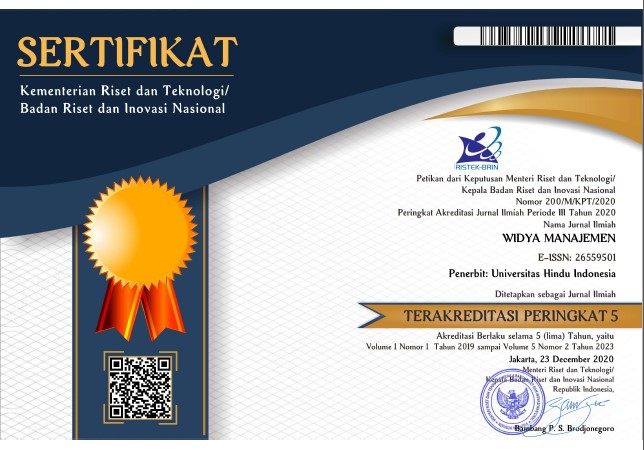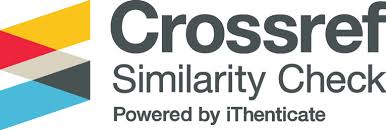Pengaruh Green Practices, Functional Value, Satisfaction, dan Word of Mouth terhadap Revisit Intention pada Hotel Mercure Grand Mirama
Abstract
The result of this research has a goal to understand there effect of Green Practices, Functional Value, Satisfaction, and Word of Mouth on Revisit Intention to Hotel Mercure Grand Mirama Surabaya. This research used 150 people's data and the collected data were analyzed using Smart PLS software version 3.2.2. The results of this study show that Green Practices have a positive and significant effect on Functional Value, Satisfaction, Word of Mouth, and Revisit Intention. Then Functional Value has a positive and significant effect on Satisfaction, Word of Mouth, and Revisit Intention. And Satisfaction has no significant effect on Word of Mouth but has a positive and significant effect on Revisit Intention.
References
Abror, A., Patrisia, D., Engriani, Y., Idris, I., & Dastgir, S. (2021). Islamic bank trust: the roles of religiosity, perceived value and satisfaction. Asia Pacific Journal of Marketing and Logistics.
Assaker, G. (2020). The effects of hotel green business practices on consumers’ loyalty intentions: an expanded multidimensional service model in the upscale segment. International Journal of Contemporary Hospitality Management, 32(12), 3787-3807.
Balaji, M. S., Jiang, Y., & Jha, S. (2019). Green hotel adoption: a personal choice or social pressure? International Journal of Contemporary Hospitality Management, 31(8), 3287-3305.
Bintarti, S., & Kurniawan, E. N. (2017). A study of revisit intention: Experiential quality and image of Muara Beting tourism site in Bekasi District. European Research Studies Journal, 20(2A), 521-537.
Caber, M., Albayrak, T., & Crawford, D. (2020). Perceived value and its impact on travel outcomes in youth tourism. Journal of Outdoor Recreation and Tourism, 31, 100327.
Chan, S. (2018). Factors Affecting Revisit Intention with Customer Satisfaction as a Mediating Variable in Eco Friendly Resorts. Jurnal Manajemen Inovasi, 9(1).
Farhan, Afif. 2013. 3 Alasan Menerapkan Green Hotel di Indonesia. https://travel.detik.com/travel-news/d-2371854/3-alasan-menerapkan-green-hotel-di-indonesia diakses pada 17 Maret 2021.
Hair, J. F., Black, W. C., Babin, B. J., Anderson, R. E., (2010). Multivariate Data Analysis (7th Edition). New Jersey: Pearson Prentice Hall.
Juliana, J., Putri, F. F., Wulandari, N. S., Saripudin, U., & Marlina, R. (2021). Muslim tourist perceived value on revisit intention to Bandung city with customer satisfaction as intervening variables. Journal of Islamic Marketing.
Kim, D., & Roseman, M. G. (2020). The Effect of Non-optional Green Practices in Hotels on Guests’ Behavioral Intentions. Journal of Quality Assurance in Hospitality & Tourism, 1-20.
Kim, W. G., Li, J., Han, J. S., & Kim, Y. (2017). The influence of recent hotel amenities and green practices on guests’ price premium and revisit intention. Tourism economics, 23(3), 577-593.
Khoo, K. L. (2020). A study of service quality, corporate image, customer satisfaction, revisit intention and word-of-mouth: evidence from the KTV industry. PSU Research Review.
Lee, C. H., Wahid, N. A., & Goh, Y. N. (2013). Perceived drivers of green practices adoption: A conceptual framework. Journal of Applied Business Research (JABR), 29(2), 351-360.
Lee, S., Jeong, E., & Qu, K. (2020). Exploring theme park visitors’ experience on satisfaction and revisit intention: A utilization of experience economy model. Journal of Quality Assurance in Hospitality & Tourism, 21(4), 474-497.
Lestari, R. B., & Kardinal, K. (2018). Minat Beli Produk Hijau pada Generasi Milenial. Jurnal Ilmiah Ekonomi Global Masa Kini, 9(2), 117-124.
Moise, M. S., Gil-Saura, I. & Ruiz-Molina, M.-E. (2020). “Green” practices as antecedents of functional value, guest satisfaction and loyalty. Journal of Hospitality and Tourism Insights.
Noerwenda, Ade. 2007. Green Hotel: Apa, Bagaimana dan Mengapa / 11. https://www.mmsustainability.ac.id/articles-1/green-hotel%3A-apa%2C-bagaimana-dan-mengapa-%2F-11 diakses pada 16 Maret 2021
Rajput, A., & Gahfoor, R. Z. (2020). Satisfaction and revisit intentions at fast food restaurants. Future Business Journal, 6, 1-12.
Setiawati, C. Irna. 2014. Esensi Hotel Ramah Lingkungan. https://kabarkampus.com/2014/04/esensi-hotel-ramah-lingkungan/ diakses pada 14 Maret 2021.
Song, H. M., Kim, K. S., & Yim, B. H. (2017). The mediating effect of place attachment on the relationship between golf tourism destination image and revisit intention. Asia Pacific Journal of Tourism Research, 22(11), 1182-1193.
Sthapit, E., & Björk, P. (2019). Relative contributions of souvenirs on memorability of a trip experience and revisit intention: A study of visitors to Rovaniemi, Finland. Scandinavian Journal of Hospitality and Tourism, 19(1), 1-26.
Trung, N. V. H., & Khalifa, G. S. (2019). Impact of destination image factors on revisit intentions of hotel's international tourists in Ba Ria-Vung Tau (br-vt) the mediating role of positive word of mouth. International Journal on Recent Trends in Business and Tourism (IJRTBT), 3(2), 106-115.
Van Tonder, E., Petzer, D. J., Van Vuuren, N., & De Beer, L. T. (2018). Perceived value, relationship quality and positive WOM intention in banking. International Journal of Bank Marketing.
W Lawrence, N. (2014). Social Research Methods: Qualitative and Quantitative Approaches (7th Edition). Pearson Education Limited.
Wibowo, S. F., Sazali, A., & RP, A. K. (2016). The Influence of Destination Image and Tourist Satisfaction toward Revisit Intention of Setu Babakan Betawi Cultural Village. JRMSI-Jurnal Riset Manajemen Sains Indonesia, 7(1), 136-156.
Zamroni, Mochamad. 2018. Sugito Adhi, Dibalik Kepedulian Sosial dan Lingkungan Hidup Hotel Mercure Grand Mirama. https://tunashijau.id/2018/06/sugito-adhi-dibalik-kepedulian-sosial-dan-lingkungan-hidup-hotel-mercure-grand-mirama/ diakses pada 18 Maret 2021
Zikmund, W. G., Carr, J. C., & Griffin, M. (2013). Business Research Methods (8th Edition). Cengage Learning.
Reproduction Policy
Every author submitting articles to Widya Manajemen must make a statement that the manuscript is free from plagiarism and is not being considered and published in other journals.
Articles that have been published are copyrighted by the Program Studi Manajemen FEBP UNHI. For educational purposes, the contents of the article may be duplicated or reproduced as long as the source of the article is mentioned. Written requests must be submitted to the editor to obtain permission to republish the contents of the article for purposes other than educational purposes.
-----------------------------------------------------------------------------------------------------
Kebijakan Reproduksi
Setiap penulis yang menyerahkan artikel ke Widya Manajemen harus membuat surat pernyataan bahwa naskahnya bebas dari plagiarisme dan tidak sedang dipertimbangkan dan dimuat dalam jurnal lain.
Artikel yang telah dipublikasi menjadi hak cipta Program Studi Manajemen FEBP UNHI. Untuk tujuan edukatif, isi dari artikel dapat digandakan atau direpublikasi selama menyebutkan sumber dari artikel tersebut. Permintaan tertulis harus diajukan kepada editor untuk memperoleh ijin merepublikasi isi dari artikel untuk tujuan lainnya selain tujuan edukatif.






.jpg)









